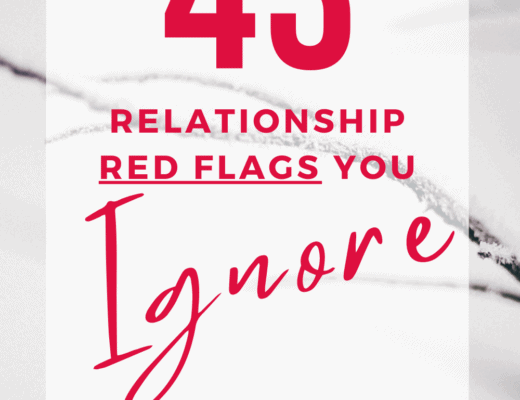Setting healthy boundaries about RESPECTING YOURSELF! When someone ignores those boundaries, they are also disrespecting you.
Personal boundaries define our safe place that we need in order to thrive. The most important boundaries revolve around our physical, emotional, sexual, time-related, intellectual, and material needs.
Whether we speak them out or not, these boundaries should exist. Yet, as much as we would like to think that everyone understands this, most just don’t get it.
In fact, the sad truth is that most boundary busters are people close to us including friends, family, and romantic partners.
These also happen to be the people that can inflict the most harm to our mental health, emotional health, and overall well-being when they are not acting in our best interests.
Research shows that when someone doesn’t respect boundaries, they are subjecting you to discomfort. Simply put, they are sending the message that your needs don’t really matter.
So, what do you do when someone doesn’t respect boundaries? You will find 10 tried and tested strategies in this post. In addition, I have shared everything you need to know about strong boundaries in relationships.
Related Posts
Healthy Vs Unhealthy Boundaries
According to a webinar by Women Advocates, healthy boundaries create space between you and another person to help each one of you to thrive and function to their fullest. They are characterized by high self-esteem, self-worth, and self-care.
Healthy boundaries encourage you to protect your personal space from intrusion in a mutually respectful relationship.
Unhealthy boundaries, on the other hand, are characterized by disempowerment, violation of personal space, and undue responsibility for other people’s lives over your own.
Boundaries are also unhealthy when they disregard your partner’s feelings, values, and needs and make it hard for them to relate with you or thrive in the relationship.
Such boundaries tend to be too weak or too rigid and they may create a conducive environment for potentially abusive or toxic relationships.
Why Should there be Boundaries in a Relationship?
A relationship without boundaries can drain and exhaust you as you strive to please other people at your own expense.
When you set boundaries, a relationship stops becoming about only the needs of others but also about prioritizing yours.
While not everyone will take such treatment kindly, boundaries make it hard for toxic people in your life and around you to take advantage of you or take you for granted. This improves your self-worth, well-being, and safety in a relationship.
Healthy boundaries lead to healthy relationships because they nurture mutual respect, self-respect, trust, and uniqueness.
With clear boundaries, there’s the specification of ownership and responsibility on either side of the line which reduces conflict and the tendency to shift blame.
Possible Reasons for Boundary Violation
People cross your boundaries for many reasons and while none of it is your fault, certain circumstances within your control can make it easier for boundary busters to keep doing it and getting away with it.
Here are some common reasons for the breach of personal boundaries in relationships:
- Unclear boundaries
- Misinterpretation of boundary needs
- Non-negotiable boundaries
- Manipulative boundaries
- Intentional disrespect
- Not following through with boundary violation consequences

How to Set Healthy Boundaries
Unless they are well set, your own boundaries might not be effective. As we’ve seen above, boundary violation can be linked back to several factors, and quite clearly, not every boundary violator acts out of disrespect.
While you cannot be held responsible for someone else’s actions, you are 100% responsible for the decisions you make, and setting boundaries that are strong and maintainable is within your power.
Here’s how to go about it:
Evaluate yourself and your Need for Boundaries
This is the part where you identify your own needs and what you expect from the other person as well as the aspects of your life that need boundaries.
You should also assess how setting your own boundaries affects your significant other or the people close to you in order to find a workable balance.
Start Small
If boundary setting is not something you have been doing before, starting with big strides will put undue pressure on you and others.
You can start with simple boundaries and build up to more complex ones even as you assess the progress and effectiveness of the process.
Express yourself Honestly and Clearly
Have you ever tried giving a non-verbal cue to your partner expecting them to act on it only to end up angry and disappointed because they didn’t? Maybe they just didn’t get it!
When it comes to boundaries, they are better expressed through open communication. You can express your thoughts and feelings and also state clearly the kind of treatment you expect. If need be, you can even put down your set boundaries on paper just so they are crystal clear.
Give your Partner an Opportunity to Respond
As I stated earlier, healthy boundaries are both about your needs and the needs of your significant other. This is why it is important to listen to what they feel about your boundaries and also give them a chance to state theirs.
From this, you can both decide where flexibility is needed. Notably, flexibility with boundaries doesn’t mean you are relenting or giving up your own needs, it just means that you are willing to meet your partner halfway to make it workable for your relationship.
Flexibility should, however, go both ways so that you are not the only one compromising.
State the Consequences for Boundary Crossing Behavior
If you set boundaries and don’t state the consequences for their violation, you are leaving room for boundaries to be crossed. Let the other person know your limits and a possible deal-breaker if they persist.
Keep Reinforcing your Boundaries
Once you are done with the boundary setting, what the other person does is beyond your control.
On your part, you can keep on reinforcing your boundaries by stating them verbally when need be, speaking out every time you experience boundary violations, and taking action when the other party repeatedly violates set boundaries.
You can employ the broken record technique, a form of assertive behavior that helps to pass across a message firm and clear.
What to do When Someone Disrespects your Boundaries
When boundaries are crossed in a relationship, you will likely feel disrespected, angry, and violated.
Sometimes, it is possible to solve a specific incident but other times, the disrespectful behavior persists to a point of threatening your mental health and general well-being.
These 10 tips can help you deal with someone who violates boundaries.
1. Calmly Take Stock of the Situation
Before you react, it helps to analyze the situation and figure out exactly what happened and why you are feeling violated.
What part of the whole situation made you feel uncomfortable? Was the boundary that they violated communicated clearly? Is boundary-busting something that they do often? Was there another way you would have liked the situation to be handled? What is the best way to handle this?
The answers to these questions can help you decide on the next step. Not reacting in the heat of the incident also denies the boundary buster the chance to use your reaction against you.
Toxic people especially have a way of making you feel guilty even when you are clearly the one who has been wronged.

2. Put your Safety First
When someone repeatedly violates your boundaries, your safety becomes a concern. If you feel safe despite the incident and think you can fix things with your significant other, check out some tips to help heal a relationship after a fight.
If you feel like you are dealing with an emotionally abusive partner, you should definitely look for outside help including talking to a trusted friend, family member, or therapist.
In dangerous circumstances involving physical abuse, threats, or someone who refuses to leave after you ask them to, don’t think twice about contacting the authorities for help.
3. Speak Out and Address the Problem
Remember what we said about cues? Ditch them!
Speak out clearly and directly about the boundaries that have been crossed. Even better, speak in the first person to convey your feelings and thoughts about what happened and the kind of treatment you expected.
While at it, allow your partner to explain themselves or give their side of the story so you can both come up with a solution and measures to keep the incident from being repeated.
4. Time the Talk
Timing is of the essence; you have already been disrespected here and the last thing you want to do is blow the situation out of control. Reacting emotionally or inviting other parties might just do that.
For example, if the incident happened in public or in the presence of other people, you can hold the conversation off for later as opposed to if it happens when the two of you are alone, whereby you can address it immediately.
Either way, don’t be in a rush to address this, it is okay to wait until you are completely calm before bringing it up.
5. Don’t Abandon your Boundaries
What if the boundaries don’t seem to be working? Of course, they might, at first- a loved one or a romantic partner isn’t going to take no for an answer kindly and they might keep violating your boundaries to twist your arm.
Sometimes, boundary violators will even guilt you or fight with you to make you relent. It doesn’t mean that you should. It is possible to be kind and still be firm
Always remind yourself that your needs are as important as theirs and learn to practice positive affirmations over yourself.
6. Remove Yourself from the Picture
Have you tried to say no to someone and they won’t take it? Or tried to quieten a toxic person and failed? You can always get up and go.
To stress this point, again and again, you are in complete control of what you do, and walking away from toxicity is a great way to exercise that right.
Whether this means physically leaving, switching off your phone to keep them from bugging you, or refusing to engage in a conversation that is disrespectful, don’t hesitate
7. Follow Through with the Deal Breaker
What did you state as the consequence of crossing this particular boundary? Follow through with it.
For example, if he has a habit of inviting his friends over to invade your time alone with him, and you have said that you are not comfortable with it, then stand up and leave him and his friends to it the next time he does it.
This way, you are communicating that you won’t tolerate that kind of disrespectful behavior.

8. Change your Response to Assertive
Some repeat boundary violators may get a kick from disrespecting you and getting the response that makes you look vulnerable, hurt, and helpless.
This makes a toxic person feel powerful and in control. However, they can only thrive as long as you don’t stand up to them.
When you stand up for yourself and defend your boundaries, you change the game completely and although this may not change them, it sure does change how you feel about yourself henceforth.
9. Make Peace With The Fact That You Can’t Change Some People No Matter What You Do
A time comes when you realize that despite all the effort you have put into trying to make people respect your boundaries, you are only draining your emotional energy.
Some people will not respect your boundaries just because you set them and the earlier you make peace with this fact the better.
Then comes the hard part; do you disengage or continue having a relationship with them? Only you can make this decision- be sure that whatever you decide is what you really want.
10. Go No Contact
Employing the no contact rule after personal boundaries are crossed repeatedly in a relationship can help you work on your emotions, reflect on the relationship, and make an unrushed decision on the future of the relationship.
No contact, allows you to maintain distance from the person who repeatedly disrespects you by avoiding physical, verbal, and even digital contact.

Conclusion
You need personal boundaries in order to flourish in all kinds of relationships. Boundaries work best when you respect other peoples’ boundaries and receive the same from them.
Unfortunately, even when you do your part, you can’t always count on others to do the same. Engaging in healthy communication, reinforcement, assertiveness, as well as putting in place strategies to deal with someone who violates boundaries increases the chance of success.
The above information helps you understand the whole process while the actionable tips give you somewhere to start





